Legacy Stories
Dennis Fase
Dennis was an offensive lineman for Kearney State University in the late-1980s. After college, he moved to Boulder, Colorado to start his career. We met in 1991 through work, married in 1995 and were blessed with three beautiful children. When Dennis was in his early 40s, his memory began to suffer, and over time he became someone we did not recognize. He battled a series of health problems, including alcoholism and eventually lost everything he held dear. On March 8, 2019, Dennis died alone, in a hotel room at age 51 from chronic abuse of ethanol. We donated his brain to the VA-BU-CLF Brain Bank, where researchers diagnosed Dennis with Stage 3 (of 4) Chronic Traumatic Encephalopathy (CTE). Now, Ben, Olivia, Alex and I are sharing Dennis’ story to show how CTE affected him, to support other CTE families, and to bring back some of the dignity Dennis lost over the last few years of his life.
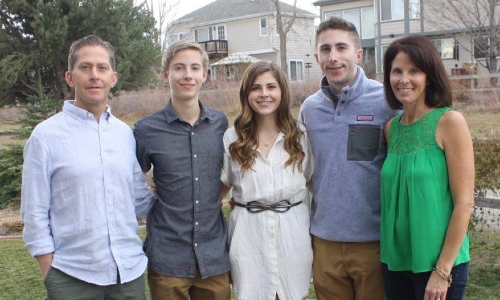
By Becky and Olivia Fase, Dennis’ wife and daughter
Dennis was happiest when surrounded by family and friends. He adored the kids and I and would tell anyone that would listen just how proud he was of us. He had a great group of friends and was well respected in the community. Through many years of hard work, putting in long hours at the office, many times at the expense of his family, Dennis built a successful career as a financial advisor. From the outside, it appeared Dennis had it all. There was no way to know that his brain was a ticking timebomb and that in just a few short years, Dennis would turn into someone almost unrecognizable.
Full-time lineman
Dennis was born in Papillon, Nebraska in 1967. Growing up, he loved the Tom Osborne-coached University of Nebraska football teams and earned himself a scholarship to play offensive line for Kearney State University in Kearney, Nebraska. There, Dennis treated football like his job. Dennis was a perfectionist and had high expectations for himself and everyone around him. He did not do anything halfway.
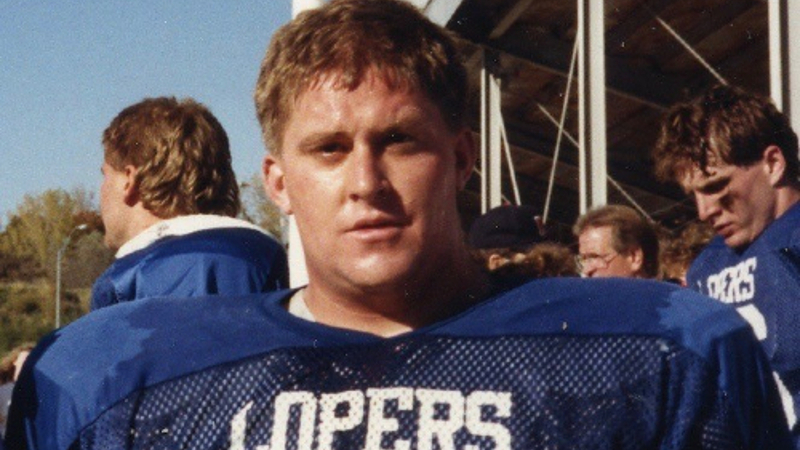
After football, Dennis directed his all-in mentality towards the next chapter of his life in the business sector. When he played his last game in 1989, Dennis weighed 265 pounds. By the time he graduated in 1990 with a degree in finance and economics, he was down to 180 pounds. This amazing feat speaks to the incredible discipline Dennis possessed.
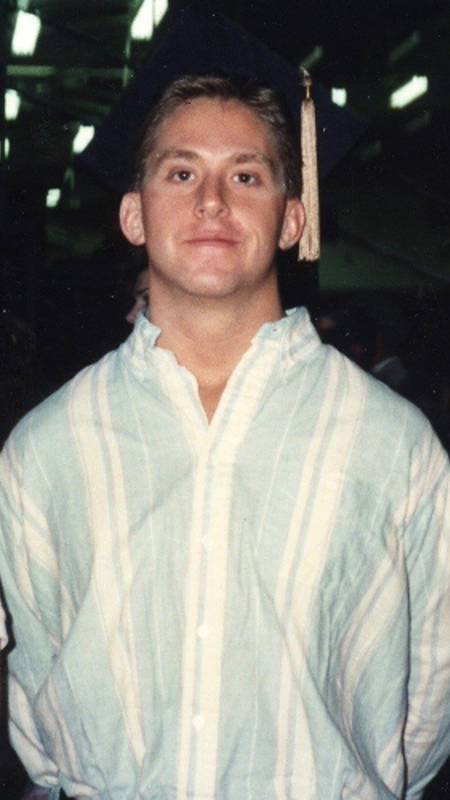
It felt to me that Dennis was obsessed with exercise. Looking back, I see that fitness was part of his mental health.
On top of his game
Dennis and I met at a training conference for Mutual of Omaha. Dennis was a good-looking guy with a sense of mystery about him. His work ethic and sense of humor were an immediate draw. It took some time to break through his shell and really get to know him but once I did, I was all in.
In 1997, Dennis started working for Merrill Lynch as a financial advisor. He was clearly talented at acquiring new clients and his genuine interest in their well-being allowed him to form long term relationships with many of them.
Dennis was an intensely disciplined man and stuck to a strict routine that supported both his work success and the standard of physical health he held himself to.

His alarm went off at 4:00 a.m., he’d be out of the house by 4:45 a.m., and be the first one at the gym when it opened at 5:00 a.m. After the gym, Dennis was one of the first to arrive at the office and one of the last to leave. This high degree of discipline was a key factor in his success.
Ben was born not long after Dennis started with Merrill Lynch. Dennis was working long days and weekends to get established and missed out on so many firsts. Things had not changed much by the time Olivia and Alex were born.
With Dennis obsessed with Nebraska football and me a huge fan of The Ohio State Buckeyes, sports became a huge part of our family. Dennis worked long hours, but he always made time for the kids’ sports. He was a constant on the sidelines or in the stands for every soccer, basketball, or football game.
Dennis’ spare time was limited, but he cared deeply about supporting local nonprofits. He sat on multiple boards and was a fixture at fundraisers for the local YMCA, hospital, and other organizations. He was just a really good man.
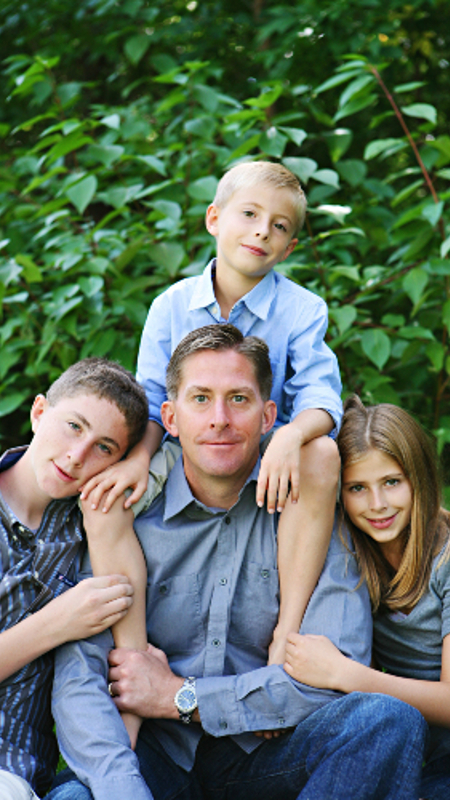
"This can’t be Dennis”
When Dennis hit his early 40s, I began to notice some oddities in his behavior. It started with forgetfulness. He couldn’t remember entire conversations, many times asking the same questions over and over. He was short tempered with the kids and seemed much more anxious and on edge. I wonder now if he knew something was happening with his brain?
Although these changes were slight, it was easy for the kids and I to notice considering how disciplined Dennis normally was. Around this same time, I read an article about former NFL tight end and Colorado Rockies executive Keli McGregor, who was diagnosed with CTE after his death in 2010 at age 47. The way Keli’s wife Lori described Keli’s late-life behavioral changes sounded all-too familiar to me. Knowing his football history, I began to wonder if Dennis too was suffering from CTE.
Despite what we were noticing at home, Dennis was able to keep it together at work, successfully closing one of the largest deals in the history of Merrill Lynch. He was recognized nationally for his achievements. Looking back, I think Dennis used everything he had to mask his heath issues at work but was unable to keep up the front at home. We suffered the brunt of his changing personality.
In 2016, a new set of problems emerged for Dennis. In addition to ongoing memory loss, he was showing more progressed cognitive impairment and suffering from severe neuropathy in his legs. The neuropathy created an awkward gait for Dennis and caused him to stumble frequently. This change in his outward appearance was a huge blow to Dennis as he prided himself on his put together presentation. The sudden motor function issues led to countless neurology appointments in search of answers. Neurologists ruled out a brain tumor and diagnosed him with Guillain-Barre Syndrome, a rare disorder where the body’s immune system attacks nerve cells.
To add to the stress of Dennis’ medical problems, his business partners had decided to dissolve him from the partnership. We were now faced with financial worries as well.
We saw moderate improvement with the IVIG treatments Dennis was receiving for Guillain-Barre, but the cognitive piece seemed to be worsening. We took Dennis to University of Colorado Health for a more rigorous neurological exam. I voiced my concerns regarding possible CTE but unfortunately, my concerns led nowhere. A physician did note Dennis had elevated liver enzymes and asked him if he had a drinking problem. Dennis denied any sort of problem and because he was a master at hiding his addiction, it never crossed my mind that some of Dennis’ health problems could be a result of alcohol abuse.
Frustrated that he still wasn’t improving, we took him to Mayo Clinic, hoping to get some answers. After a week of testing, there was still no clear diagnosis. I once again mentioned my suspicion of CTE, and once again, my concern fell on deaf ears.
“Is this our new normal?”
Dennis’ behavior was becoming increasingly erratic and he was forced to take a leave of absence from work. He was showing signs of paranoia, impulsivity, and recklessness. I don’t know how we survived the next year. Dennis would disappear for hours at a time with no indication of where he was going. If asked, he would become angry and say he didn’t need to be tracked like a child. The kids and I lived in a constant state of fear, wondering if he was ok.
When he was home, he was either in bed or sitting in the chair with the TV blaring. Where he was once the envy of the neighborhood because of his lush, immaculately kept yard, Dennis had completely lost interest in the things that had formerly brought him pride.
What made Dennis’ health problems so difficult to deal with was his complete denial that there was anything wrong with him. He thought his behavior was perfectly normal. The frustration of his erratic behavior was alienating Dennis from the kids and I as well as his friends. His verbal tirades and behavior had become so toxic that the kids didn’t want to be home alone with him.
The loss of his business partnership crushed Dennis. He felt betrayed by partners that he had worked with for more than a decade. He took immense pride in his work and the loss of their trust and respect put him into a downward spiral from which he would never recover.
We don’t know what triggered the admission, but in May 2017, Dennis admitted his drinking problem and said, “I can’t do this alone; I need help.” We immediately got him into an inpatient rehab program.
"While I was shocked to hear my dad admit he had a drinking problem, I was also relieved that we finally had an answer for his medical problems and changing personality," shared Olivia.
Following inpatient rehab, Dennis continued with intensive outpatient therapy and seemed to be more like the Dennis we knew and loved. We finally had reason for hope. Unfortunately, that hope was short lived.
Over the next year, Dennis turned into someone we barely recognized. He completely lost interest in the things he loved most: his family, his friends, his work, even his physical appearance. It was obvious that drinking had taken over his life. We were constantly smelling the cups he drank out of to see if we could detect alcohol. Even when caught red-handed, he would adamantly deny that he was drinking. It just did not make sense. How could this intelligent, proud, caring, disciplined man have fallen so far and why wasn’t he fighting to get better? We now know that what was happening in his brain didn’t allow him to make sound decisions or think clearly.
“We cannot continue to live like this”
The kids and I begged Dennis to go back into rehab but because he honestly believed he did not have a problem; our pleas fell on deaf ears. Olivia was especially relentless in trying to convince him and took it especially hard when he refused. I eventually gave Dennis the ultimatum of going back to rehab or moving out of our home. Dennis checked into a hotel.
“I was sure he heard me”
After seeing improvement in his behavior, I asked Dennis to join us for a family trip in December 2018. He was not comfortable traveling but did move back home over the holidays to look after the family dog, Louie. When we returned from vacation, Dennis was in bad shape, with abrasions all over his face. He claimed he fell over Louie’s leash on a walk. A neighbor told us they had found Dennis passed out, face down outside. We once again pleaded with Dennis to go back into rehab. Upon his refusal, I insisted that he move out of our home. We had gotten a glimmer of the old Dennis so forcing him to move out once again was devastating for all of us.
Weeks went by with periodic communication between us and Dennis. Unwilling to give up, Olivia reached out frequently to ask her dad to consider rehab. He continued to refuse.
On March 1, 2019, Dennis stopped by the house to pick up more clothes. While in the driveway, Dennis took a nasty fall that resulted in a trip to the emergency room. His blood alcohol level registered at nearly four times the legal limit.
When he was released from the hospital, I took him back to the hotel and Dennis shared plans of wanting to find new clients and get back to work. I was overjoyed to hear him talk like this and reminded him how good he was at his job. I assured him he could achieve so much if he could just stop drinking. It was a great conversation, and I was sure he had heard me. I left that day with more hope than I had felt in quite some time.
Just one week later, on March 8, Olivia came home from college for spring break with the intent of convincing her dad to go back into rehab. When she arrived at the hotel, she found Dennis face down and unresponsive. He was soon pronounced dead at age 51. The cause of death was chronic abuse of ethanol.
Relief and sadness
I had long desired for Dennis’ brain to be studied. After his death, we donated his brain to the VA-BU-CLF Brain Bank. Researchers there confirmed what we had long suspected. They found he had Stage 3 (of 4) Chronic Traumatic Encephalopathy (CTE).
The diagnosis brought many things to our family, namely an explanation for the inexplicable. We were relieved to be able to ascribe what had taken Dennis from the regimented and successful man he was into the state he was in before his death.
We also felt immense sorrow. No matter how hard he tried, Dennis was not going to be able to overcome what was happening in his brain. He lost a two-front war with addiction and a degenerative brain disease. Even if he had been able to conquer his drinking problem, Dennis was living with a disease that currently has no cure.
Don't doubt yourself
We hope that by sharing Dennis’ story, we can repair some of the dignity he lost late in life and help his friends and former colleagues understand how CTE affected his mood, behavior, and cognition.
I hope to do for other wives what Lori McGregor did for me a decade ago.
It is critical to trust your instincts if you suspect your partner might have CTE. You also need to extend yourself to resources. You don’t have to fight this battle alone.
Do not doubt yourself. You're seeing the symptoms and you probably know your spouse better than anyone. If you suspect CTE, reach out to available resources. CLF is here to help.
Nearly two years removed from Dennis’ passing, the kids and I are a galvanized unit. The hardship of seeing my kid’s father and my husband deteriorate before our eyes, and the shared trauma of losing Dennis has brought us closer than ever. I think Dennis would be incredibly proud of our children and how they have handled themselves through this tragedy. My hope is that in sharing our story, we can make the journey a bit easier for other families dealing with CTE.
We’re here for you if you have a loved one who is exhibiting signs of CTE. Please reach out to our HelpLine so a member of our team can provide individualized support for your situation.
You May Also Like

Living with suspected CTE can be difficult, but CTE is not a death sentence and it is important to maintain hope. Find out how.
Living with CTE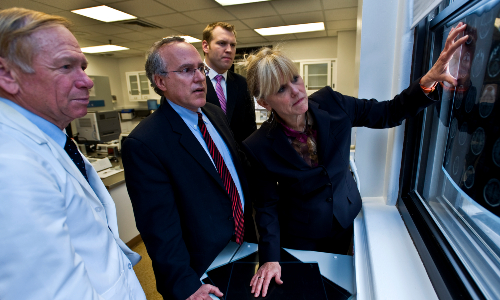
Although we cannot yet accurately diagnose CTE in living people, a specialist can help treat the symptoms presenting the most challenges.
CTE Treatments